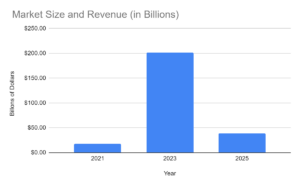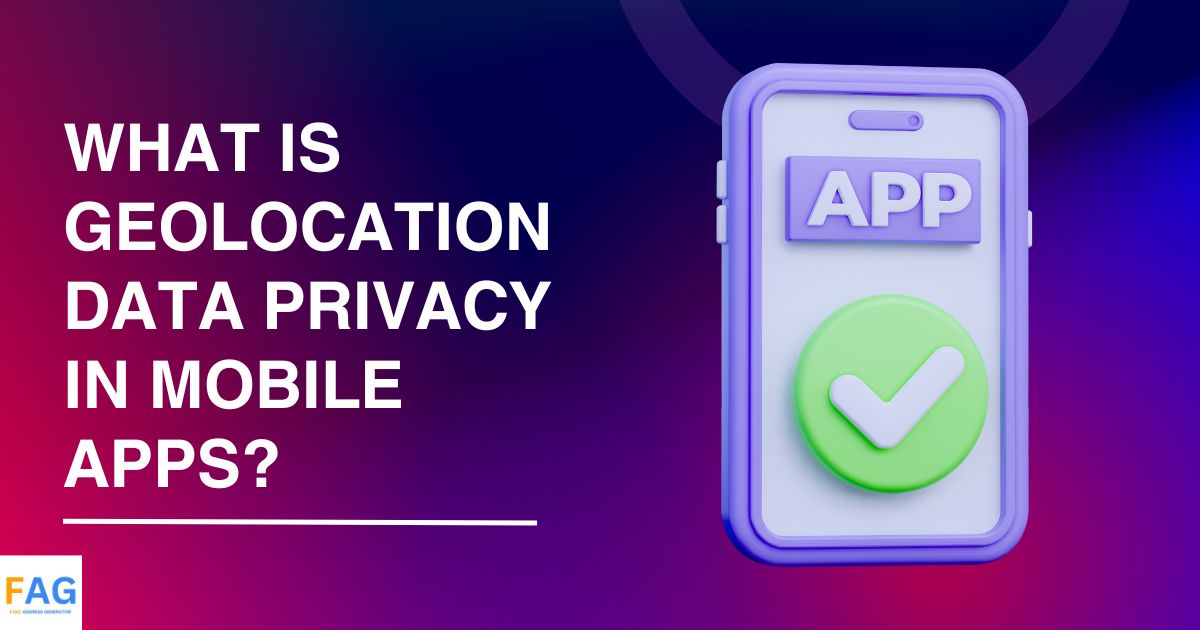Geolocation data privacy in mobile apps has become increasingly important in recent years. With the widespread use of mobile devices and the increasing amount of location data being collected by apps, users are becoming more concerned about the privacy and security of their personal information. Geolocation data refers to the location information that is collected by mobile apps about a user’s location, such as their GPS coordinates, Wi-Fi network, or cell tower triangulation.

Mobile apps use mobile location data for a variety of purposes, including providing location-based services, such as maps and directions and targeted advertising. However, the collection and use of this data can raise significant privacy concerns, particularly if the data is shared with third parties without the user’s consent. Users may also be concerned about the security of their location data, as it can be used to track their movements and potentially reveal sensitive information about their daily routines and habits. As a result, many users are seeking greater control over their geolocation data and are looking for ways to protect their privacy while using mobile apps.

Understanding Geolocation Data in Mobile Apps
Geolocation data is information that identifies the geographical location of a device, user, or object. Mobile apps collect it using GPS, Wi-Fi networks, cell towers, and IP addresses. The apps use this data to provide location-based services, such as navigation, weather updates, and local recommendations. However, the collection and use of geolocation data raise privacy concerns, especially when it comes to mobile apps.
| Data Point | Details |
|---|---|
| Types of Location Data | GPS coordinates, Wi-Fi network information, Cell tower information, IP addresses |
| Use of Geolocation Data | Navigation, weather updates, local recommendations, targeted advertising |
| Privacy Concerns | Tracking without consent, risks to vulnerable communities, potential use for surveillance |
| Regulations | GDPR in Europe, CPRA in the USA, requiring user consent and providing data management rights |
| Best Practices for Developers | Obtain explicit consent, provide privacy controls, educate users about privacy |
| User Actions for Privacy | Cautious about app permissions, turn off location services when not in use, manage app permissions |
The Role of GPS and Location Services
GPS (Global Positioning System) is a satellite-based navigation system that provides location and time information. It is widely used in mobile devices to provide accurate location data. Location services, on the other hand, are software-based services that use a combination of GPS, Wi-Fi networks, and cell towers to determine the location of a device. They are used by mobile apps to provide location-based services.
Geolocation Technology: How It Works
Geolocation technology uses a combination of GPS, Wi-Fi networks, cell towers, and IP addresses to determine a device’s location. GPS provides accurate location data, but it requires a clear view of the sky to work properly. Wi-Fi networks and cell towers are used when GPS is not available or accurate enough. IP addresses are used to determine a device’s location when it is connected to the Internet.
Types of Location Data Collected by Apps
Mobile apps collect different types of location data, including:
- Latitude and longitude: This is the most accurate type of location data and is collected using GPS.
- Wi-Fi network information: This includes the names and locations of Wi-Fi networks that the device has connected to.
- Cell tower information: This includes the IDs and locations of cell towers that the device has connected to.
- IP address: This is used to determine a device’s location when it is connected to the Internet.
Mobile apps use location data to provide location-based services, such as weather updates, local recommendations, and targeted advertising. However, the collection and use of geolocation data raise privacy concerns, especially when it comes to mobile apps. Users need to be aware of the types of location data that apps collect and how it is used to protect their privacy.
Privacy Implications of Location Data

Geolocation data sets collected from mobile apps can be used for various purposes, but they also raise privacy concerns. The following subsections will explore some of the potential privacy risks associated with location data, the impact on vulnerable communities, and the difference between anonymized and personally identifiable information.
Potential Privacy Risks
One of the main privacy risks associated with location data is the potential for it to be used to track an individual’s movements without their knowledge or consent. This can be particularly concerning for vulnerable communities, such as victims of domestic violence or stalking, who may be at risk if their location data falls into the wrong hands.
Another potential privacy risk is the use of location data for targeted advertising. While some users may find this helpful, others may feel uncomfortable with the idea of their location being used to tailor ads to their interests and behavior.
The Impact on Vulnerable Communities
As mentioned above, vulnerable communities such as victims of domestic violence or stalking may be particularly at risk if their location data is collected and used without their knowledge or consent. In addition, certain communities may be more likely to have their location data collected and used for surveillance purposes, such as communities of color or those living in low-income areas.
Anonymized Versus Personally Identifiable Information
While some location data may be anonymized or aggregated to protect users’ privacy, other data may be personally identifiable and, therefore, more sensitive. For example, if location data is combined with other personal information, such as a user’s name or address, it may be possible to identify them even if their location data is anonymized.
It is important for mobile app developers to be transparent about what data they are collecting and how it will be used. They should also provide users with the option to opt out of data collection if they so choose. Additionally, users should be aware of the potential privacy risks associated with location data and take steps to protect their privacy, such as turning off location services for apps that do not require them.
Legal and Ethical Considerations
As geolocation data is considered personal data, it is subject to privacy laws and regulations, such as the General Data Protection Regulation (GDPR) in Europe and the California Privacy Rights Act (CPRA) in the United States. Mobile apps that collect geolocation data must comply with these laws and regulations, which require obtaining user consent, providing clear privacy policies, and implementing appropriate data protection measures.
The GDPR and California Privacy Rights Act
Under the GDPR, geolocation data is considered sensitive personal data, which requires explicit user consent for collection and processing. Additionally, the GDPR requires that users have the right to access, modify, and delete their geolocation data. The CPRA also requires explicit user consent for the collection and processing of geolocation data, as well as providing users with the right to access and delete their data.
Ethical Use of Geolocation Data
In addition to complying with privacy laws and regulations, mobile apps that collect geolocation data must also consider the ethical implications of using this data. Mobile app developers must ensure that they are using geolocation data in ways that are transparent, fair, and respectful to users’ privacy rights. This includes providing users with clear information on how their data is being collected and used, as well as obtaining explicit user consent for any data processing activities.
Furthermore, mobile app developers must ensure that they are not using geolocation data in ways that may harm or discriminate against users. For example, using geolocation data to deny users access to certain services or opportunities based on their location may be considered discriminatory and unethical.
In summary, mobile apps that collect geolocation data must comply with global privacy regulations, such as the GDPR and CPRA, and consider the ethical implications of using this data. By implementing appropriate data protection measures and obtaining explicit user consent, mobile app developers can ensure that they are using geolocation data in ways that are transparent, fair, and respectful of users’ privacy rights.
Best Practices for Geolocation Data Privacy
Mobile apps that collect geolocation data must follow best practices to protect user privacy. Here are some recommended practices that app developers should follow:
Obtaining User Consent
App developers should obtain explicit user consent before collecting geolocation data. This consent should be obtained prominently and clearly, and the user should be informed of the purpose for which the data is being collected. The app should provide an option for the user to opt out of geolocation data collection at any time.
Implementing Privacy Controls
App developers should implement privacy controls to give users control over their geolocation data. These controls should allow users to manage their location data and delete it if they wish. The app should also provide options to limit the sharing of geolocation data with third parties.
Educating Users on Privacy
App developers should educate users about the importance of geolocation data privacy. This education should include information on how geolocation data is collected, used, and protected. The app should also provide information on how to manage geolocation data and how to protect privacy on mobile devices.
By following these best practices, app developers can ensure that they are protecting user privacy while still providing the functionality that users expect from mobile apps.
Video Guide
Frequently Asked Questions
How can users protect their privacy when using geolocation services in mobile apps?
Users can protect their privacy when using geolocation services in mobile apps by being mindful of the permissions they grant to the app. They should only grant location access to trusted apps and limit the number of apps that have access to their location data. Users should also periodically review the app permissions and revoke access to any apps that they no longer use or trust. Additionally, users can turn off location services when not in use to prevent apps from continuously tracking their location.
What are the implications of location tracking for user privacy in mobile applications?
Location tracking in mobile applications can have significant implications for user privacy. App developers can use geolocation data to track users’ movements, build detailed profiles of their behavior, and even sell this data to third-party advertisers and data companies. This can result in targeted advertising, unwanted solicitations, and even identity theft. Furthermore, if this data falls into the wrong hands, it can be used for malicious purposes such as stalking or burglary.
How do mobile app developers address privacy concerns related to geolocation data?
Mobile app developers can address privacy concerns related to geolocation data by implementing privacy policies that clearly outline how they collect, use, and share this data. They can also provide users with clear and concise notifications when location services are being used and obtain explicit consent before collecting or sharing this data. Developers can also implement security measures such as encryption and anonymization to protect users’ geolocation data.
What are the legal considerations regarding geolocation data privacy in mobile apps?
Legal considerations regarding geolocation data privacy in mobile apps vary by jurisdiction. In the United States, mobile app developers must comply with the Children’s Online Privacy Protection Act (COPPA) and the California Consumer Privacy Act (CCPA), which regulate the collection and use of geolocation data. In the European Union, the General Data Protection Regulation (GDPR) and the ePrivacy Directive set out strict requirements for the collection, use, and sharing of geolocation data.
In what ways can turning off geolocation services impact app functionality and user experience?
Turning off geolocation services can impact app functionality and user experience in several ways. Some apps may not function properly without access to location data, while others may provide limited functionality or require users to manually input their location. Additionally, turning off location services can impact the accuracy of location-based services such as navigation or weather forecasting.
What methods are available for users to manage and control their geolocation data in mobile apps?
Users can manage and control their geolocation data in mobile apps by reviewing app permissions and disabling location services for apps that do not require it. They can also use privacy settings in their device’s operating system to control which apps have access to their location data. Additionally, some mobile apps allow users to opt out of location tracking or delete their location history.










